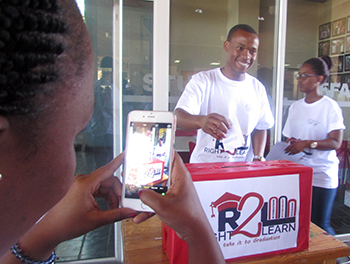Latest News Archive
Please select Category, Year, and then Month to display items
10 March 2022
|
Story Anthony Mthembu
|
Photo Unsplash
 The No Student Hungry team gearing up to start distributing food parcels to the selected students.
The No Student Hungry team gearing up to start distributing food parcels to the selected students.
The UFS is one of the many institutions of higher learning where food insecurity is an active issue. However, the
No Student Hungry Programme is one of the initiatives launched at the university to assist in fighting food insecurity at the institution.
The purpose of the programme
Since its inception in 2011, the initiative has assisted many students in acquiring a healthy meal. Additionally, the Food Environment Office also hands out food packages, so that students can continue to achieve academically. “We are trying to develop a healthy environment for students and make it easier for them to have a nice and healthy meal,” stated Annelize Visagie, who heads the Food Environment Office at the UFS. The Food Environment programme is spread out on all three campuses, each with its own facilitators. Furthermore, the programme mainly caters for students who are not funded by the National Student Financial Aid Scheme (NSFAS) but who are excelling academically. The abovementioned students apply for assistance online, and a list is then drawn up of students who receive assistance for the year.
Alternative solutions to keep the initiative running
On the Bloemfontein Campus, the No Student Hungry Programme will be catering for 200 students in the 2022 academic year, assisting them with a daily nutritious meal. Additional food parcels are also handed out to provide further assistance. “We give food parcels to the students on the list every Tuesday and Thursday at the Thakaneng Bridge,” Visagie highlighted. However, she argues that catering for the student population through this programme can be a challenge, as the demand for assistance is growing rapidly and the ability to assist is limited. The programme relies on partnerships and sponsors to assist the student body. In fact, the coordinators of the programme currently have a memorandum of understanding with Tiger Brands according to which they deliver around 100 food parcels for distribution.
In addition, the coordinators have put in place alternative measures to ensure that they can provide more food to students. “The
Kovsie Act Office, in partnership with the
Department of Sustainable Food Systems and Development, has started a food garden where healthy and nutritious produce are grown, in order to add value to the distribution,” she indicated. Although the programme can only assist to a point, students who are in desperate need of assistance are never turned away. In fact, the
Social Support Unit at Thakaneng Bridge usually assists students with food vouchers for a maximum of four days.
A commitment to teaching healthy eating habits
The programme is not only committed to curbing food insecurity, but also to ensuring that students have a healthy and balanced diet. As such, a booklet is being issued by the
Department of Nutrition and Dietetics in collaboration with the Department of Sustainable Food Systems and Development, which contains ways in which students can make a healthy meal using some of the ingredients offered in the food parcels.
“We want to teach students how to eat healthy in the cheapest way, because they don’t have a lot of money to buy expensive food products,” Visagie argued.
Right to Learn campaign seeks to fund financially needy students
2015-11-11
 SRC President, Lindokuhle Ntuli, pledges financial support to the Right to Learn campaign.
Photo: Tango Twasa |
In response to the dire need for financial relief for academically deserving students from underprivileged backgrounds, the Student Representative Council (SRC) of the University of the Free State (UFS) launched the Right to Learn campaign on Friday 30 October 2015. The campaign, which aims to counter deregistration, was initiated following the national #FeesMustFall campaign, which gained momentum after students from the University of Witwatersrand first mobilised against the proposed fee increases for 2016.
The SRC’s Projects Committee realised that, although President Jacob Zuma had consented to a 0% increment, the lack of an increase would not eliminate the financial burden currently facing some students.
“The campaign was conceived at the SRC’s strategic planning meeting, and is now spearheaded by the SRCs Projects Committee,” said Letsika Leqoalane, SRC: Academic Affairs. “The campaign was founded on the university's value of ‘Superior Scholarship’ and the SRC’s value of reducing student financial exclusions,” he added.
Students in pursuit of continued access to education
The Right to Learn campaign was established as a supplementary initiative to the #FeesMustFall movement. “The Right to Learn campaign is an initiative to raise funds for students who are facing financial exclusion in the coming year,” said the SRC Academics Affairs officer.
All proceeds will be channeled towards reducing the number of students who will face de-registration in 2016, the SRC textbook bursary, and food bursaries. “This campaign stands on three pillars, namely: no to de-registration, no to student food insecurity, and yes to textbooks,” explained Leqoalane.
A call for support
According to SRC President, Lindokuhle Ntuli, “SRC members have made pledges of no less than R500 each from their own pockets.” The SRC is appealing to the UFS community to make donations into the campaign bank account, and thereafter to email the proof of payment to Ntuli at NtuliL@ufs.ac.za. The account details are:
Account number: 15-7085-0721 ABSA Bank Branch
Reference: SRC FUND
Branch Code: 632005 Cheque Account
Swift code: ABSAZAJJ